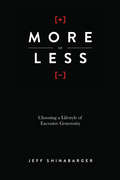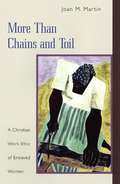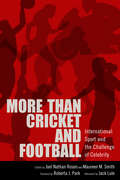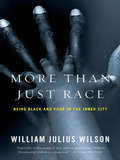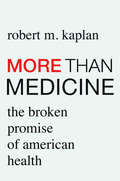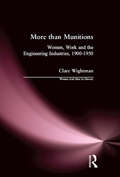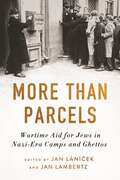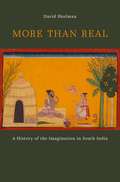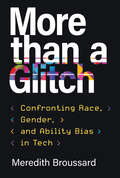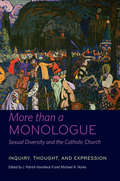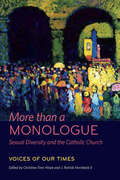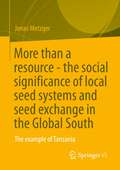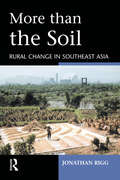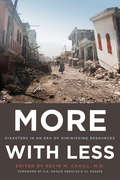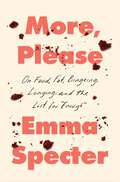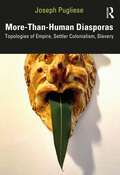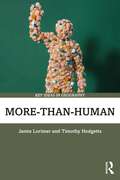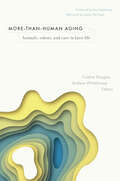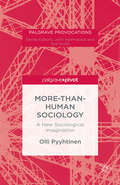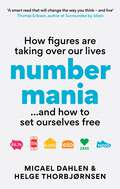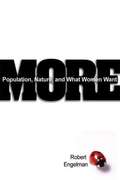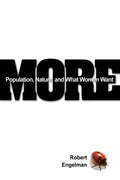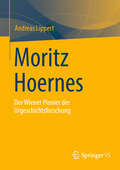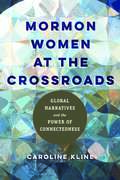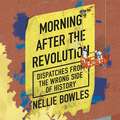- Table View
- List View
More or Less
by Jeff ShinabargerIn More or Less, Jeff Shinabarger calls readers to create their own social experiments to answer the question, "What is enough?" It all started with one idea: What would happen if we created a culture in which we gave away whatever was more than enough for us? How would our habits change if we shed the excess of money, clutter, and food in our lives? In More or Less, readers will learn how to draw a line of "enough" in their consumer choices, how to see generosity as a chance to experience freedom in a greedy world, and how to make small changes now that will help others forever. As Shinabarger reminds them, defining "enough" is more than a responsibility--it is an opportunity to give hope. With a foreword by Bob Goff.
More than Chains and Toil: A Christian Work Ethic of Enslaved Women
by Joan M. MartinIn More than Chains and Toil, Joan Martin explores the experiences of enslaved women and the realities of their social world to uncover the interrelationships among moral agency, work, and human meaning. She then reflects ethically on the implications such a distinct perspective on labor might have for women in contemporary African American communities and for broader discussions about the meaning of work in American society.
More than Cricket and Football: International Sport and the Challenge of Celebrity
by Jack LuleContributions by Lisa Doris Alexander, Sean Bell, Benn L. Bongang, Joel S. Franks, Silvana Vilodre Goellner, Annette R. Hofmann, Dong Jinxia, Cláudia Samuel Kessler, Jack Lule, Li Luyang, Mark Panek, Roberta J. Park, Gamage Harsha Perera, Joel Nathan Rosen, Viral Shah, Maureen M. Smith, Nancy E. Spencer, Dominic Standish, Tim B. Swartz, Dan Travis, Theresa Walton-Fisette, and Zhong YijingGiven the presumed dominance of American sport, many fans throughout the hemisphere find it difficult to envision the role of sport beyond the confines of their own continent. And yet, world sport consists of so much more than the games Americans play and so much more than the stereotype of cricket for the elite and football for the working class. As worldwide sport continues to gain in popularity, we also see parallels to many aspects visible in North American sport, particularly celebrity and all its trappings and pitfalls.The success of athletes from other countries in basketball and ice hockey, and the proliferation of stars imported and now exported to and from North America, provides some better examples of sport’s international power. It also creates a very new kind of sport celebrity, albeit one that often shows a rather limited reach beyond that star’s own country or continent. Thus, rather than focusing on the Western Hemisphere, this collection of some of world sport’s most heralded celebrities (including stars of Motocross, surfing, distance running, and more) serves as a sort of passport to many places that make up our global sporting environment.
More than Just Race: Being Black and Poor in the Inner City (Issues of Our Time)
by William Julius WilsonA preeminent sociologist of race explains a groundbreaking new framework for understanding racial inequality, challenging both conservative and liberal dogma. In this timely and provocative contribution to the American discourse on race, William Julius Wilson applies an exciting new analytic framework to three politically fraught social problems: the persistence of the inner-city ghetto, the plight of low-skilled black males, and the fragmentation of the African American family. Though the discussion of racial inequality is typically ideologically polarized. Wilson dares to consider both institutional and cultural factors as causes of the persistence of racial inequality. He reaches the controversial conclusion that while structural and cultural forces are inextricably linked, public policy can only change the racial status quo by reforming the institutions that reinforce it.
More than Medicine: The Broken Promise of American Health
by Robert M. KaplanAmerican science produces the best medical treatments in the world. Yet U.S. citizens lag behind in life expectancy and quality of life. Robert Kaplan marshals extensive data to make the case that U.S. health care priorities are sorely misplaced—invested in attacking disease, not in solving social problems that engender disease in the first place.
More than Munitions: Women, Work and the Engineering Industries, 1900-1950 (Women And Men In History)
by Clare WightmanClare Wightman explores the key issue of gender in explaining the experience of men and women at work. She uses women's employment in the engineering industries between 1900 and 1950 to confront many of the contentious debates in women's history. She shows that the two World Wars did not produce radical changes for women at work. Throughout the book the author questions the leading role given to gender ideology in constructing the attitudes of employers, and suggests that it was only one factor among many which shaped women's experiences in the workplace. This is a major study with wide and challenging implications for the subject.
More than Parcels: Wartime Aid for Jews in Nazi-Era Camps and Ghettos
by Rebecca Erbelding Stefan Cristian Ionescu Jan Lánícek Pontus Rudberg Gerald J. Steinacher Katarzyna Person Anne Lepper Book Review Editor Eliyana R. Adler Laurie Drake Silvia Goldbaum Fracapane Alicja Jarkowska Jan Lambertz Philip PascuzzoMore than Parcels: Wartime Aid for Jews in Nazi-Era Camps and Ghettos edited by Jan Lánícek and Jan Lambertz explores the horrors of the Holocaust by focusing on the systematic starvation of Jewish civilians confined to Nazi ghettos and camps. The modest relief parcel, often weighing no more than a few pounds and containing food, medicine, and clothing, could extend the lives and health of prisoners. For Jews in occupied Europe, receiving packages simultaneously provided critical emotional sustenance in the face of despair and grief. Placing these parcels front and center in a history of World War II challenges several myths about Nazi rule and Allied responses. First, the traffic in relief parcels and remittances shows that the walls of Nazi detention sites and the wartime borders separating Axis Europe from the outside world were not hermetically sealed, even for Jewish prisoners. Aid shipments were often damaged or stolen, but they continued to be sent throughout the war. Second, the flow of relief parcels—and prisoner requests for them—contributed to information about the lethal nature of Nazi detention sites. Aid requests and parcel receipts became one means of transmitting news about the location, living conditions, and fate of Jewish prisoners to families, humanitarians, and Jewish advocacy groups scattered across the globe. Third, the contributors to More than Parcels reveal that tens of thousands of individuals, along with religious communities and philanthropies, mobilized parcel relief for Jews trapped in Europe. Recent histories of wartime rescue have focused on a handful of courageous activists who hid or led Jews to safety under perilous conditions. The parallel story of relief shipments is no less important. The astonishing accounts offered in More than Parcels add texture and depth to the story of organized Jewish responses to wartime persecution that will be of interest to students and scholars of Holocaust studies and modern Jewish history, as well as members of professional associations with a focus on humanitarianism and human rights.
More than Real
by David ShulmanFrom the fifteenth to the eighteenth centuries, the major cultures of southern India underwent a revolution in sensibility reminiscent of what had occurred in Renaissance Italy. During this time, the imagination came to be recognized as the defining feature of human beings. More than Real draws our attention to a period in Indian history that signified major civilizational change and the emergence of a new, proto-modern vision. In general, India conceived of the imagination as a causative agent: things we perceive are real because we imagine them. David Shulman illuminates this distinctiveness and shows how it differed radically from Western notions of reality and models of the mind. Shulman's explication offers insightful points of comparison with ancient Greek, medieval Islamic, and early modern European theories of mind, and returns Indology to its rightful position of intellectual relevance in the humanities. At a time when contemporary ideologies and language wars threaten to segregate the study of pre-modern India into linguistic silos, Shulman demonstrates through his virtuoso readings of important literary works-works translated lyrically by the author from Sanskrit, Tamil, Telugu, and Malayalam-that Sanskrit and the classical languages of southern India have been intimately interwoven for centuries.
More than a Glitch: Confronting Race, Gender, and Ability Bias in Tech
by Meredith BroussardWhen technology reinforces inequality, it&’s not just a glitch—it&’s a signal that we need to redesign our systems to create a more equitable world.The word &“glitch&” implies an incidental error, as easy to patch up as it is to identify. But what if racism, sexism, and ableism aren&’t just bugs in mostly functional machinery—what if they&’re coded into the system itself? In the vein of heavy hitters such as Safiya Umoja Noble, Cathy O&’Neil, and Ruha Benjamin, Meredith Broussard demonstrates in More Than a Glitch how neutrality in tech is a myth and why algorithms need to be held accountable.Broussard, a data scientist and one of the few Black female researchers in artificial intelligence, masterfully synthesizes concepts from computer science and sociology. She explores a range of examples: from facial recognition technology trained only to recognize lighter skin tones, to mortgage-approval algorithms that encourage discriminatory lending, to the dangerous feedback loops that arise when medical diagnostic algorithms are trained on insufficiently diverse data. Even when such technologies are designed with good intentions, Broussard shows, fallible humans develop programs that can result in devastating consequences.Broussard argues that the solution isn&’t to make omnipresent tech more inclusive, but to root out the algorithms that target certain demographics as &“other&” to begin with. With sweeping implications for fields ranging from jurisprudence to medicine, the ground-breaking insights of More Than a Glitch are essential reading for anyone invested in building a more equitable future.
More than a Monologue: Inquiry, Thought, and Expression (Catholic Practice in North America)
by J. Patrick Hornbeck II and Michael A. NorkoThis volume, like its companion, Voices of Our Times, collects essays drawn from a series of public conferences held in autumn 2011 entitled “More than a Monologue.” The series was the fruit of collaboration among four institutions of higher learning: two Catholic universities and two nondenominational divinity schools. The conferences aimed to raise awareness of and advance informed, compassionate, and dialogical conversation about issues of sexual diversity within the Catholic community, as well as in the broader civic worlds that the Catholic Church and Catholic people inhabit. They generated fresh, rich sets of scholarly and reflective contributions that promise to take forward the delicate work of theological-ethical and ecclesial development. Along with Voices of Our Times, this volume captures insights from the conferences and aims to foster what the Jesuit Superior General, Fr. Adolfo Nicolas, has called the “depth of thought and imagination” needed to engage effectively with complex realities, especially in areas marked by brokenness, pain, and the need for healing. The volumes will serve as vital resources for understanding and addressing better the too often fraught relations between LGBTQ (lesbian, gay, bisexual, transgender, and queer) persons, their loved ones and allies, and the Catholic community.Inquiry, Thought, and Expression explores dimensions of ministry, ethics, theology, and law related to a range of LGBTQ concerns, including Catholic teaching, its reception among the faithful, and the Roman Catholic Church’s significant role in world societies. Within the volume, a series of essays on ministry explores variousperspectives not frequently heard within the church. Marriage equality and the treatment of LGBTQ individuals by and within the Roman Catholic Church are considered from the vantage points of law, ethics, and theology. Themes of language and discourse are explored in analyses of the place of sexual diversity in church history, thought, and authority.The two volumes of More than a Monologue, like the conferences from which they developed, actively move beyond the monologic voice of the institutional church on the subject of LGBTQ issues, inviting and promoting open conversations about sexual diversity and the church. Those who read Inquiry, Thought, and Expression will encounter not just an excellent resource for research and teaching in the area of moral theology but also an opportunity to actively listen to and engage in groundbreaking discussions about faith and sexuality within and outside the Catholic Church.
More than a Monologue: Voices of Our Times
by Christine Firer Hinze J. Patrick HornbeckThe Second Vatican Council’s landmark document Gaudium et spes called Catholics to cultivate robust, mutually enriching dialogue with the modern world by attentively and discerningly listening to the “voices of our times.” This distinctive new publication, the first of two volumes that explore sexual diversity and the Catholic Church, gathers an important set of these voices: the testimonies and reflections of Catholic and former Catholic LGBTQ (lesbian, gay, bisexual, transgender, and queer) persons, their friends, family members, and those who teach and accompany them. Drawn from a series of conferences held in autumn 2011 and offering a spectrum of professional, generational, and personal perspectives, the essays in Voices of Our Times suggest the breadth and complexity of Catholic experiences of and engagements with sexual diversity. Each writer locates her or his reflections in careful attention to how ways of experiencing sexuality and speaking about sexual diversity are embodied in and shaped by particular practices—familial, interpersonal, professional, ecclesial, cultural, and political. Part I, “Practicing Love,” introduces the voices of singles, families, couples, parents, and children who reflect on their experiences of sexual diversity in light of their experiences of Catholicism and of Catholics. Part II, “Practicing Church,” offers the perspectives of clergy and lay ministers, casting light on what pastoral workers, Catholic and otherwise, encounter as they walk with people who are grappling with issues of faith and sexuality. In Part III, “Practicing Education,” writers discuss their experiences with sexual diversity in Catholic educational settings as teachers, as students, and as witnesses to the lives, loves, and struggles of LGBTQ young adults. Finally, Part IV, “Practicing Belonging,” spotlights contributions by authors who have struggled with their identities and place within and around the Catholic community. Striving to acknowledge, honor, and respect the truth and value embodied in both LGBTQ persons’ lives and in the Catholic tradition, this book provides a close-to-the-ground look at the state of the conversation about sexual diversity among contemporary Roman Catholics in the United States. Along with its companion volume, Inquiry, Thought, and Expression, Voices of Our Times represents a unique opportunity for readers inside and outside the Catholic community to engage in a conversation that is at once vibrant and complex, difficult and needed.
More than a resource - the social significance of local seed systems and seed exchange in the Global South: The example of Tanzania
by Jonas MetzgerSeeds are at the heart of a transformation process that affects more than two billion people worldwide. This study on smallholder farmers in Tanzania examines how local seed systems are anchored in the socio-cultural structures of smallholder life worlds. Using the example of seeds, the close interweaving of agricultural and social practice is traced and it is worked out how individual processes of modernisation brought in from outside have far-reaching consequences for smallholder coexistence. The study provides a concrete, detailed and differentiated account of everyday farming life and of how smallholder households deal with seeds. A particular focus is on seed exchange relationships and how these provide both social security and social cohesion in the study region. The study is based on extensive field research and intensive interviews with farmers, who also have their own say in the work.
More than the Soil: Rural Change in SE Asia
by Jonathan RiggMore than the Soil focuses on the social, cultural, economic and technological processes that have transformed rural areas of Southeast Asia. The underlying premise is that rural lives and livelihoods in this region have undergone fundamental change. No longer can we assume that rural livelihoods are founded on agriculture; nor can we assume that people envisage their futures in terms of farming. The inter-penetration of the rural and urban, and the degree to which rural people migrate between rural and urban areas, and shift from agriculture to non-agriculture, raises fundamental questions about how we conceptualise the rural Southeast Asia and the households to be found there.
More with Less: Disasters in an Era of Diminishing Resources (International Humanitarian Affairs)
by Kevin M. CahillNatural and human-made disasters are increasing around the world. Hurricanes, typhoons, earthquakes, tsunamis, droughts, and resultant famine, floods, and armed conflicts are constant reminders of the frailty of our human race. Global warming may cause whole island states to be submerged as the oceans rise. In the past these acute and recurring crises have been met by the international community responding to UN andmedia appeals. The economic collapse of nations is now a reality; some of those most affected had been traditional, generous donors to disaster relief operations. It is unlikely—probably impossible—that they will beable to continue to contribute overseas when their own domestic needs are unmet.A recent New York Times front page report suggested that one of the few domestic issues to have bipartisan support was to cut the foreign aid budget. This book analyzes the global economic forecast and the UnitedNations pattern of philanthropy, provides a case study of how one nation with a tradition of giving will cope in the face of a marked reduction in flexible funds and then provides thoughtful chapters on new approachesto disaster preparedness and disaster response.
More, Please: On Food, Fat, Bingeing, Longing, and the Lust for "Enough"
by Emma SpecterAS FEATURED IN NYLON • W MAGAZINE • HEYALMA • BUSTLE • ELECTRIC LITERATURE • ROMPER • AND MORE!An unflinching and deeply reported look at the realities of binge-eating disorder from a rising culture commentator and writer for Vogue.Millions of us use restrictive diets, intermittent fasting, IV therapies, and Ozempic abuse to shrink until we are sample-size acceptable. But for the 30 million Americans who live with eating disorders, it isn’t just about less. More, Please is a chronicle of a lifelong fixation with food—its power to soothe, to comfort, to offer a fleeting escape from the outside world—as well as an examination of the ways in which compulsory thinness, diet culture, and the seductive promise of “wellness” have resulted in warping countless Americans’ relationship with healthy eating.Melding memoir, reportage, and in-depth interviews with some of the most prominent and knowledgeable commentators currently writing about food, fatness, and disordered eating—Virginia Sole-Smith, Virgie Tovar, Aiyana Ishmael, Leslie Jamison, and others—Emma Specter explores binge-eating disorder as both a personal problem and a societal one. In More, Please, she provides a context, a history, and a language for what it means to always want more than you’ll allow yourself to have.
More-Than-Human Diasporas: Topologies of Empire, Settler Colonialism, Slavery
by Joseph PugliesePugliese’s More‑Than‑Human Diasporas breaks the confines of existing scholarship in its vision of the way that more‑than‑human diasporic entities—such as water, trees, clay, stone and architectural styles—have functioned as agents within the context of empire, settler colonialism and a largely effaced history of Mediterranean enslavement, a history that pre‑existed and then coincided with the Atlantic slave trade. This book traces, for example, the diasporic travels of the eucalyptus from Indigenous Country to Joseph Banks’ botanical collection in London and then onto a grand English‑style garden in Southern Italy which was built on the historically effaced labour of enslaved people.By deploying techniques of historical recovery, this book brings to light otherwise buried histories, thereby demonstrating the pivotal role of Mediterranean enslavement in the shaping of Italian society and culture. This book develops a topological understanding of cultural history to account for the complex spatio‑temporal effects that connect seemingly disparate times, spaces and more‑than‑human entities within networks of relationality. In this innovative scholarly work, more‑than‑human diasporic entities function as conceptual keys to histories which would otherwise remain hidden, thereby revealing desubjugated knowledges which reconfigure anthropocentric histories and further the process of decolonisation.This book will be of interest to readers interested in transnational and local histories of empire, settler colonialism and slavery.
More-than-Human (ISSN)
by Jamie Lorimer Timothy HodgettsThis text offers the first book-length introduction to more-than-human geography, exploring its key ideas, main debates, and future prospects.An opening chapter traces the origins and emergence of this field of enquiry and positions more-than-human geography as a response to a set of intellectual and political crises in Western thought and politics. It identifies key literatures and thinkers and reflects on the varying usages and meanings of the idea of the more-than-human. Three subsequent sections explore cross-cutting themes that draw together the disparate strands of more-than-human geography: examining new materialisms developed in the field, analysing knowledge practices and methodologies, and finally reflecting on the political and ethical implications of a more-than-human approach. A final chapter examines the tensions between this approach and cognate work in environmental geography to review the strengths and the limitations of more-than-human geographies, and to speculate as to their near future development.Introducing the key idea of more-than-human geography, this book will be an important resource for undergraduate and postgraduate students of human geography, environmental geography, cultural and social geography, and political geography.
More-than-Human Aging: Animals, Robots, and Care in Later Life (Global Perspectives on Aging)
by Andrew Whitehouse Cristina DouglasWhat does later life look like when it is lived in the companionship of other species? Similarly, how do other species age (or not) with humans, and what sort of (a)symmetries, if any, are brought to light around how we understand and think about aging? So far, aging has been investigated in the social sciences in purely human terms. This is the first collection of original work that considers aging as taking place in relation to other species. This volume aims to start a conversation about aging by taking its more-than-human participants seriously—that is, not only as a support for or context of human aging but also, more symmetrically, as agents and subjects in the process of aging. The contributors draw upon richly descriptive ethnographic accounts, including moments of connection between seniors and dogs in a long-term care facility, human care for aging laboratory animals, and robotic companionship in later life. The ethnographies in this volume not only enrich our understanding of more-than-human companionship during the human aging process but also challenge and urge us to rethink what it means to live later in life in ecologically entangled social and moral worlds.
More-than-Human Sociology: A New Sociological Imagination
by O. PyyhtinenMore-than-Human Sociology is a call for a bolder, more creative sociology. Olli Pyyhtinen argues that to make sociology responsive to life in the 21st century we need a new sociological imagination, one that addresses connectivity, understands the world in which we live as both a human and non-human world, and is sensitive to the multiple scales on which things exist. A fresh and innovative take on the promise of sociology, this book will appeal to scholars and students both within sociology and the social sciences more broadly.
More. Numbers. Every. Day.: How Figures Are Taking Over Our Lives – And Why It's Time to Set Ourselves Free
by Micael Dahlen Helge ThorbjørnsenHow many steps have you done today?How many emails answered?How much money have you spent this week And how many hours have you slept?Welcome to the numberdemic, where a deluge of figures, stats and data manipulate your every move. From the way you work, date and exercise to the products you buy and the news you read, numbers have worked their way into every part of our lives. But is life better this way? How are all of those numbers affecting us?With fascinating, sometimes frightening and sometimes shrewdly funny research, behavioural economists Micael Dahlen and Helge Thorbjørnsen explain why we're so attached to numbers and how we can free ourselves from their tyranny. Along the way, you'll learn why viral videos, however inaccurate, become more convincing with every view; how numbers can affect the way we physically age, if we let them; why the more films you rate the less impressive you'll find them and how numbers that 'anchor' themselves in your brain can affect the size of your mortgage - plus much more.Sharp, insightful and totally engaging, MORE. NUMBERS. EVERY. DAY. is your vaccination against a world obsessed with numbers.'An entertaining and thought-provoking antidote to the tyranny of numbers in the modern world. By looking at the psychology of how we are tricked, goaded and often crushed by endless quantification, the authors present a winning case for weaning ourselves off number-dependence.'-Alex Bellos, author of Can You Solve My Problems?'Everybody should read this book. A smart and insightful read that will totally change the way you think - and live.'-Thomas Erikson, author of Sunday Times bestseller Surrounded By Idiots'Written in lucid, skillfully translated prose that puts the science into philosophical perspective, this shines a fascinating light on the modern-day obsession with numerical quantity over quality.' -Publishers Weekly'In 31,234 words Dahlen and Thorbjørnsen cast their four critical, and at times whimsical, eyes at our numbered existences revealing that consuming too much 'pi' might be bad for our health.'-Professor Scott Page, author of The Model Thinker
More: Population, Nature and What Women Want
by Robert EngelmanIn the capital of Ghana, a teenager nicknamed "Condom Sister" trolls the streets to educate other young people about contraception. Her work and her own aspirations point to a remarkable shift not only in the West African nation, where just a few decades ago women had nearly seven children on average, but around the globe. While world population continues to grow, family size keeps dropping in countries as diverse as Switzerland and South Africa. The phenomenon has some lamenting the imminent extinction of humanity, while others warn that our numbers will soon outgrow the planet's resources. Robert Engelman offers a decidedly different vision--one that celebrates womens' widespread desire for smaller families. Mothers aren't seeking more children, he argues, but more for their children. If they're able to realize their intentions, we just might suffer less climate change, hunger, and disease, not to mention sky-high housing costs and infuriating traffic jams. In More, Engelman shows that this three-way dance between population, womens' autonomy, and the natural world is as old as humanity itself. He traces pivotal developments in our history that set population--and society--on its current trajectory, from hominids' first steps on two feet to the persecution of 'witches' in Europe to the creation of modern contraception. Both personal and sweeping, More explores how population growth has shaped modern civilization --and humanity as we know it. The result is a mind-stretching exploration of parenthood, sex, and culture through the ages. Yet for all its fascinating historical detail, More is primarily about the choices we face today. Whether society supports women to have children when and only when they choose to will not only shape their lives, but the world all our children will inherit.
More: Population, Nature, and What Women Want
by Robert EngelmanIn the capital of Ghana, a teenager nicknamed "Condom Sister" trolls the streets to educate other young people about contraception. Her work and her own aspirations point to a remarkable shift not only in the West African nation, where just a few decades ago women had nearly seven children on average, but around the globe. While world population continues to grow, family size keeps dropping in countries as diverse as Switzerland and South Africa. The phenomenon has some lamenting the imminent extinction of humanity, while others warn that our numbers will soon outgrow the planet's resources. Robert Engelman offers a decidedly different vision--one that celebrates women's widespread desire for smaller families. Mothers aren't seeking more children, he argues, but more for their children. If they're able to realize their intentions, we just might suffer less climate change, hunger, and disease, not to mention sky-high housing costs and infuriating traffic jams. In More, Engelman shows that this three-way dance between population, women's autonomy, and the natural world is as old as humanity itself. He traces pivotal developments in our history that set population--and society--on its current trajectory, from hominids' first steps on two feet to the persecution of "witches" in Europe to the creation of modern contraception. Both personal and sweeping, More explores how population growth has shaped modern civilization--and humanity as we know it. The result is a mind-stretching exploration of parenthood, sex, and culture through the ages. Yet for all its fascinating historical detail, More is primarily about the choices we face today. Whether society supports women to have children when and only when they choose to will not only shape their lives, but the world all our children will inherit.
Moritz Hoernes: Pionier der Urgeschichtsforschung
by Andreas LippertDer Band ist eine Biografie des ersten Lehrkanzelinhabers für Prähistorische Archäologie im deutschen Sprachraum. Nach einer längeren Zeit von Forschungen in Bosnien und der Herzegowina fand Hoernes eine Anstellung in der Prähistorischen Sammlung des Naturhistorischen Hofmuseums in Wien. Hier erst entschied er sich für urgeschichtliche Forschungen. Er habilitierte sich für das Fach 1892 und wurde bereits 1899 zum außerordentlichen Univ.-Professor an der Universität Wien ernannt. 1911 erfolgte dann seine Berufung als ordentlicher Univ.-Professor an dieser Universität. Hoernes verfasste einige bedeutende Übersichtswerke zur Urgeschichte in Europa, die noch heute Geltung haben, und zahlreiche Fachbeiträge.
Mormon Women at the Crossroads: Global Narratives and the Power of Connectedness
by Caroline KlineThe Church of Jesus Christ of Latter-day Saints continues to contend with longstanding tensions surrounding gender and race. Yet women of color in the United States and across the Global South adopt and adapt the faith to their contexts, many sharing the high level of satisfaction expressed by Latter-day Saints in general. Caroline Kline explores the ways Latter-day Saint women of color in Mexico, Botswana, and the United States navigate gender norms, but also how their moral priorities and actions challenge Western feminist assumptions. Kline analyzes these traditional religious women through non-oppressive connectedness, a worldview that blends elements of female empowerment and liberation with a broader focus on fostering positive and productive relationships in different realms. Even as members of a patriarchal institution, the women feel a sense of liberation that empowers them to work against oppression and against alienation from both God and other human beings. Vivid and groundbreaking, Mormon Women at the Crossroads merges interviews with theory to offer a rare discussion of Latter-day Saint women from a global perspective.
Morning After the Revolution: Dispatches From the Wrong Side of History
by Nellie BowlesFrom former New York Times reporter Nellie Bowles comes an irreverent romp through the sacred spaces of the new left.As a Hillary voter, a New York Times reporter, and a frequent attendee at her local gay bars, Nellie Bowles fit right in with her San Francisco neighbors and friends - until she started questioning whether the progressive movement she knew and loved was actually helping people.When her colleagues suggested that asking these questions meant she was 'on the wrong side of history,' Bowles did what any reporter worth her salt would do: she started investigating for herself. The answers she found were stranger - and funnier - than she'd expected.In Morning After the Revolution, Bowles gives readers a front-row seat to the absurd drama of a political movement gone mad. With irreverent accounts of attending a multi-day course on 'The Toxic Trends of Whiteness,' following the social justice activists who run 'Abolitionist Entertainment, LLC,' and trying to please the New York Times's 'disinformation czar,' she deftly exposes the more comic excesses of a movement that went from a sideshow to the very centre of Western life.Deliciously funny and painfully insightful, Morning After the Revolution is a moment of collective psychosis preserved in amber.
